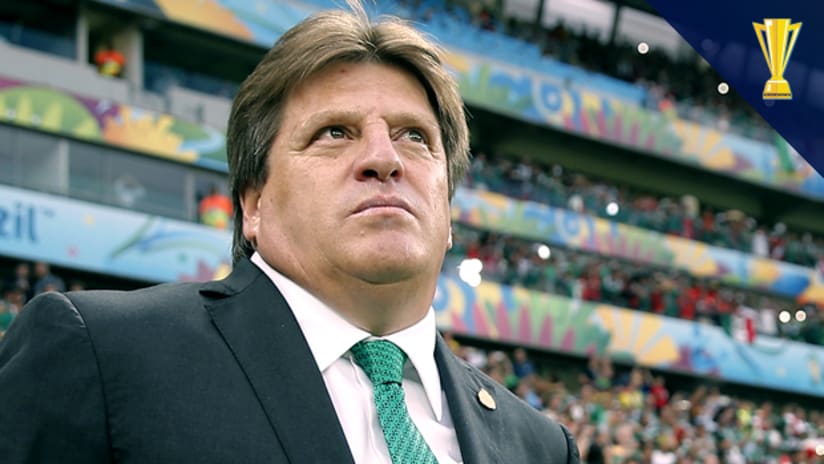Mexico manager Miguel “Piojo” Herrera's back is against the wall.
A six-game run without a win – as well as some controversial political tweets by the manager – leave Herrera’s approval ratings at an all-time low. The once beloved and energetic leader of El Tri has quickly lost the trust and support of many fans.
Since the team’s recent failure at Copa América, Mexican soccer's notoriously fickle attitude towards managers has honed in on "Piojo." Last Saturday, Herrera was asked (twice) during a press conference whether he would be fired if Mexico didn’t win the Gold Cup. His refusal to answer the question said plenty about pressure the El Tri manager and squad will face during the Gold Cup.
Even with low expectations for Mexico’s “B” team in Chile, the team still found a way to underwhelm supporters after collecting just two points in the group stage, most notably losing their group finale to Ecuador, a result Herrera said would be a “fracaso” – a failure – prior to the match.
That bold statement, the kind Herrera has become known for and delivered on in the past, ratcheted up the stakes. The expectations for July are now clear: nothing short of a Gold Cup title will do for El Tri.
Barring one of the worst failures in the history of Mexican soccer, Mexico should have little trouble making it out of the group stage. Looking at Group C, Trinidad and Tobago, Cuba, and Guatemala shouldn't trouble El Tri. However, an opponent like Costa Rica or the United States could prove to be a significant roadblock in the knockout stage, just like Panama in the 2013 semifinals.
Last Saturday, Los Ticos secured a 2-2 draw against Mexico in a friendly at the Citrus Bowl. During the first half, Costa Rica were the superior side, their pace and possession causing problems for El Tri. A change in formation and a few substitutions helped capture a draw and excuses could be made about the atypical 5-2-3 formation that Herrera utilized in the first half, but this time there was no "B" team to blame for another disappointing result.
Meanwhile, the United States celebrated two massive victories against the Netherlands and Germany in June. Let’s also not forget that the USMNT defeated El Tri 2-0 just a few months ago at the Alamodome – another Dos a Cero for the United States, another annoying reminder for Mexico supporters about the growth of the American team, not to mention their recent poll position in CONCACAF.
And while it's dark days for El Tri – through the exacting lens of the Mexican media, at least – the Gold Cup could return them to a place in the sun. Mexico’s roster not only has the talent to win the competition, but to also dominate it.
In the attack, Javier Hernandez, Giovani dos Santos, Carlos Vela, and Oribe Peralta should be able to terrify any CONCACAF defense. Even the 31-year-old Peralta, who is the fourth-choice striker, has the ability to fill the net if given an opportunity.
In the midfield, El Tri’s strong European presence continues with Andres Guardado, Hector Herrera, Jonathan dos Santos, and Jesus Manuel Corona. At his best, Herrera is arguably the best player in North America, and the 22-year-old Corona is becoming a flashy attacking threat.
While Mexico’s weak point may be the defense, there is still plenty of trust in 29-year-old goalkeeper Guillermo Ochoa, who enjoyed a standout World Cup in Brazil.
With a 2017 Confederation Cup playoff on the line, not to mention regional bragging rights, Herrera has undoubtedly saved his best players for the Gold Cup. On paper, no other CONCACAF team can trump Mexico’s roster.
And therein lies the rub.
If Mexico win, they've simply done what's expected. But if they don't and another fracaso mars their summer, it will be Herrera's El Tri legacy – and almost certainly his job – that goes up in smoke.













